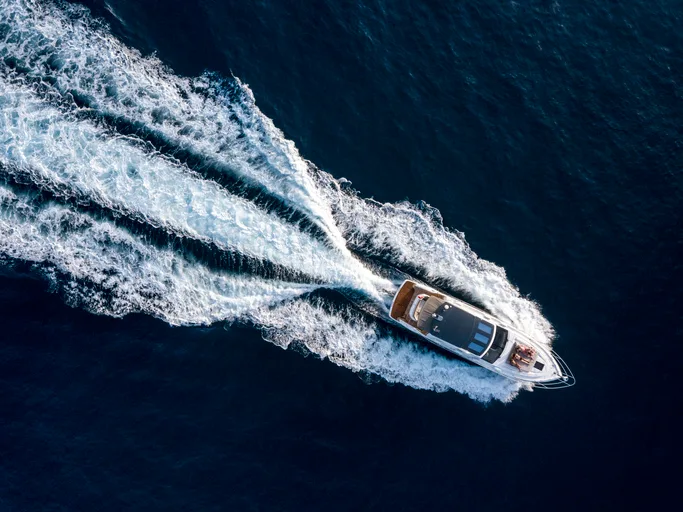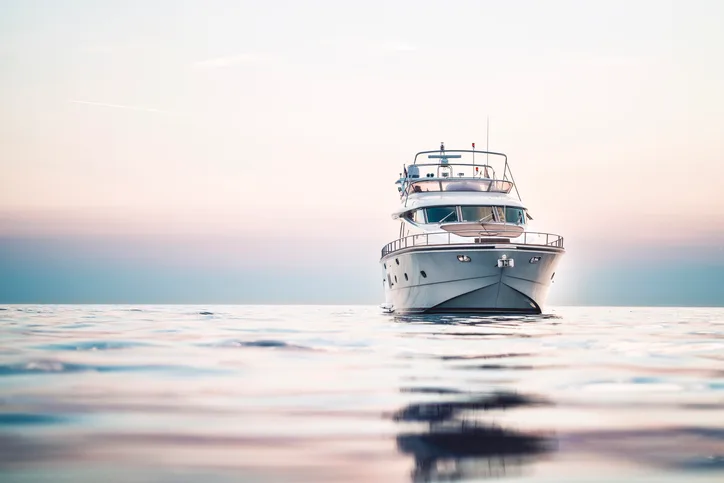In the world of the super rich superyacht owners, staff have to be able to get anything from anywhere within 24 hours. Recently, a “Mrs” (shorthand for a boat owner’s wife) woke up on a superyacht in the Caribbean, far from habitation. She wanted 1000 white roses to adorn the craft. The crew arranged for the flowers to be helicoptered from Miami, then brought to the yacht in time for dinner. The following morning, the Mrs wanted them gone. Unable to throw them into the sea and too far away to drop them at a port, the crew had to jam them into their tiny quarters.
Such stories of extravagance are rife at the Monaco Yacht Show today, where more than 580 exhibitors have set up stalls around the marina. There are ship designers, brokers, interior decorators and recruitment agencies. Here, if you can pay, you can have whatever you want: Swarovski crystalencrusted anchors, personalised toilet rolls and diamanté light fittings. You can buy gold dumbbells for your gym, gold swan taps for your bathroom and gold bins for your tampons.
In the water are 125 boats. Some are newly built for private owners, brought here by the shipyards as an advertisement to other buyers. The biggest at the show is Tis – 111.5 metres, 18 guests, 38 crew, cinema, helipad and spa, chartered for $3.3 million a week. Plus expenses.
The show is one of the only times owners can see one another’s boats, because with extreme wealth comes extreme privacy. Yachts are often registered offshore and their billionaire owners kept anonymous. They might be used as offices, holiday homes or hiding places. And what happens on board, stays on board, with members of the crew often signing non-disclosure agreements.
So what does happen on board and below deck? Many crew members are reluctant to speak, fearful of lawsuits from their bosses – the richest people in the world – and of becoming known as “difficult” to recruitment companies. The ones who do talk describe glamorous destinations and large, tax-free pay packets, mixed with long hours, social isolation, sexual harassment and depression. It’s a combination that people call the “golden handcuffs”.
Alice Tiller, 33, worked in the industry for eight years. She began her career on a private superyacht that also had a “shadow boat”, a decommissioned oil-supply boat converted into a luxury storage unit. It followed the main boat, carrying equipment and services the owner may want access to on a whim: gyms, spas, casinos, meeting rooms and garages for supercars and bikes.
I was doing 18-hour days for six months while the boss was on board,” Tiller says. “Every morning, the owner took the female crew to work out with him on the shadow boat. I don’t know [why] … I was new to the industry, so I didn’t really know otherwise.” In the gym, the owner would “touch us” in a way that felt “inappropriate” for a boss. Tiller now sees it as harassment. But even with hindsight she says it would have been impossible to refuse. You either say yes or you get fired.
The same owner offered to fund breast enlargements for his six female employees. (Tiller declined.) While on the same boat, Tiller had to share a room with the captain and, looking back, she is “really not OK with what I put myself through”. The captain would try to open the bathroom door while she was in the shower. “It was always put down to ‘just banter’,” she says. “He would get into my bed when I was asleep and try to kiss and touch and feel me. Multiple times he tried to make it lead to more. He was my boss.”
According to a 2018 survey into sexual harassment in the industry from the Professional Yachting Association, 40 per cent of respondents said they had been the recipient of unwanted physical contact while working, mostly from a fellow crew member. The closest thing a superyacht has to “human resources” is the captain, but he answers to the owner. In Tiller’s case, both the captain and the owner were the perpetrators, but regardless of the set-up, she is sure she would have been fired for complaining rather than helped for whistleblowing. “Weinstein, Epstein … rich people can kind of do whatever they want,” shrugs Tiller.
Karine Rayson initially joined the superyacht industry for the travel and adventure, but ended up feeling like a glorified cleaner. “It’s back-to-back all summer,” she says. “You’re vacuuming the same spot you vacuumed half an hour ago. You clean with an earbud, you polish the inside of a tap with a toothpick, you go completely mad.”
Rayson is a trained counsellor now and provides FaceTime therapy and mentoring for people working at sea, going by the name The Crew Coach. She tells me crew turnover is high, sometimes because impatient owners suddenly decide to fire someone, but mostly because of “crew burnout”. Rayson remembers being woken up at 3am one morning to get the owner’s 10-year-old son ice cream.
Like the navy, the management system on board is hierarchical. The captain, who, according to Boat International, can earn between $12,000 and $26,000 a month, has the final say. Below the captain, responsibilities are split into four: the “interior” team – mostly women, called “stews” – do the housekeeping, laundry and guest service. They earn $6000 to $12,000 a month. Then there are the chefs ($7000–$14,000), engineers ($7000–$19,000) and, finally, the mostly male deck crew ($4000–$11,000), who take care of the outside of the boat and drive the tenders.
The superyachts in Monaco are spotless. Every time a guest goes down to their room, a stew will go in after them to reposition the towel sculpture or refold the end of the loo roll. It makes them look like expensive business hotels – as if no-one has ever existed on them. There are no scuffs from kids rollerblading, no wine stains from wild parties, no evidence of life.
While the Maritime Labour Convention protects the employment rights of people working at sea, private yachts don’t have to comply – they’re billionaires’ own personal floating kingdoms. “When you’re recruited by the richest people in the world,” says Rayson, “whatever you’re faced with, you just have to deal with it.”
There is the option to report onboard crimes to the authorities, but it’s rife with complications. Under international maritime law, people on board a vessel are subject to the jurisdiction of the flag state where the vessel is registered, and you must be present in that country to report the crime. (As well as its flag state, a yacht is also subject to the laws of whichever country’s waters it’s currently in.)
The longer you stay in the industry, the harder it is to get out, Rayson continues. The pay is high for the skills required to be a stew (essentially a housekeeper). “If you’ve been polishing with an earbud for five years, you’re not upskilling as you would in a land-based job,” she says. “It’s hard to know where to go next.” The money, sun and travel keep crew coming back, despite ill treatment. Hence the golden handcuffs.
Cara Edson, 25, worked as a deckhand on a boat in northern Europe when she was 19. As the only woman, she says there was a lot of “hardcore banter”. Then one night, while the boat was in a Dutch port for repair, the crew went out together. “I know I didn’t drink that much,” Edson says. “My drink must have been spiked. The last thing I remember is going home and throwing up, then I was in someone else’s bed. I was terrified, I had no idea where I was, but I looked around and I was next to another crew member.”
Edson says she has flashbacks of being raped by him. The next morning she told the chief stewardess what had happened and went to the pharmacy to get the morning-after pill. The captain fired the alleged perpetrator. “The thing that still sits with me is that we never went to the police,” Edson says. “But how do you deal with it in a foreign country? What processes do you have to go through? The crew are all from different countries, you’re not in one place for long, plus the boat is registered somewhere else.” It is a stateless existence, so institutions and authorities feel meaningless.
It wasn’t until Edson went home to New Zealand, 18 months later, that she felt able to address her depression and went to therapy. She still works in the industry, sailing high-performance boats.

Another deckhand, Sophie Woodly, says she often has a “shower cry”. “We might sound like we joke about it,” says the 24-year-old from the UK. “But there’s nowhere else to go. You’re being cheery for the guests, working long hours, weeks at a time of not being on land, sharing a small bedroom. The shower is the only place where you can lock the door and be truly alone.”
Woodly is a vocal campaigner for mental health in the industry. Three years ago, while working on a superyacht, she became depressed and struggled to socialise. It was made worse by difficult relationships with her colleagues. She started therapy in the South of France, but wasn’t there for long enough to go regularly.
“On numerous occasions, when we would be out at sea doing long trips, I would be on watch at 2am. I’ve gone to the back of the boat and stood there on the edge, looking out into absolute darkness. And I’ve thought to myself, ‘If I stepped overboard right now, nobody would know.’ It just felt all too easy.”
In December 2018, a British superyacht crew member, Andrew Clapham, 32, took his own life in the Caribbean. A few months before, Sinead McNamara, an Australian, killed herself in Greece while on board the $215 million Mayan Queen IV. In the June before that, a crew member of a superyacht in Boston killed himself.
Woodly started taking antidepressants and slowly began to get stronger. One day she asked her captain for a day off to collect a new round of pills. She claims the captain fired her on the spot. “He used the words, ‘Your condition will be a burden on the crew. If you’re not capable of doing the job, then you shouldn’t have the job.’ I was capable, but this world has an obsession with everybody being perfect.”
Back at Monaco today, Woodly is sunny and full of life as she puts cushions away on the top deck of a yacht, laughing with her colleagues. She has started Skype therapy sessions with Rayson and feels everyone on board should have counselling. Despite her chequered experiences, she has boomeranged back to the industry, found a job on another yacht and is still working. “This is a very nomadic life and it suits me,” she says. “When I get a couple of months off, I can travel wherever and I don’t have to stick to a budget – it’s freedom. The pros of this job far outweigh the cons.” Looking around at the people perusing the yachts, they are all variations of the same theme: they are practically all male, wearing a pastel shirt pulled taut over a fat belly, slicked-back hair and big sunglasses. The few female customers I see are nipped, tucked and plumped.
Most of the women at the show are working. Some walk around the marina in identical evening gowns and heels – they work for the brokers as promo girls. On board, stewardesses are giving tours. Most wear little skorts and tight white polo shirts.
All the crew I see are slim and attractive, and the longer I’m here the more it makes sense. You are buying a superyacht – your perfect pleasure palace. You can choose its length and height and where the helipad goes. You pick out the colour of the cushions, the number of crystals on the chandeliers, the bed sheets. The final accessory? The staff. In the superyacht world, having identicallooking female crew is a status symbol. Blondes are bought to match.

According to Tiller, when applying for a job in the superyacht world, your CV must include a photo and often a full-body shot, plus your height, weight and dress size. “I’ve been there when captains have gone through a pile of girls’ CVs and said, ‘Too fat, too short, too ugly.’ It happens regularly. These people can just buy what they want. It’s like prostitution.”
Meanwhile, the super-rich hover above the real world. They get whatever they want and are subject to no single authority. It makes it difficult to apply normal rules and ethics. In this realm, a pinch on the arse comes with a whopping tip; 18-hour days with three-month breaks; ridiculous demands with exotic backdrops. If you pay someone enough, their answer is always “yes”, but money is not the only price.
This article originally appeared in the April issue of marie claire.










